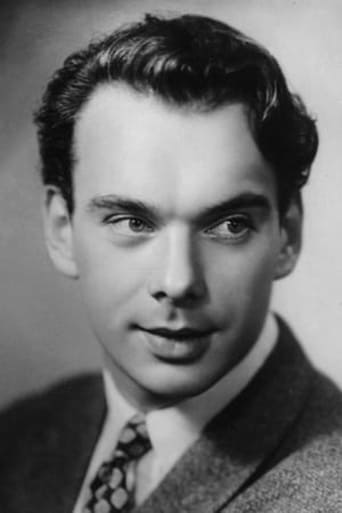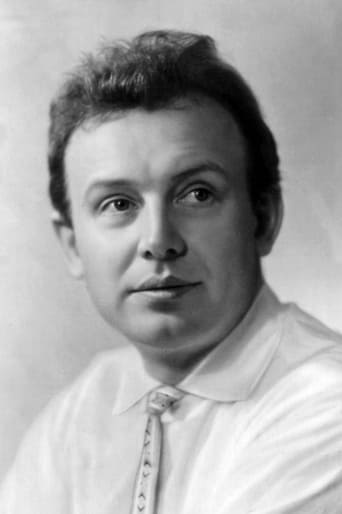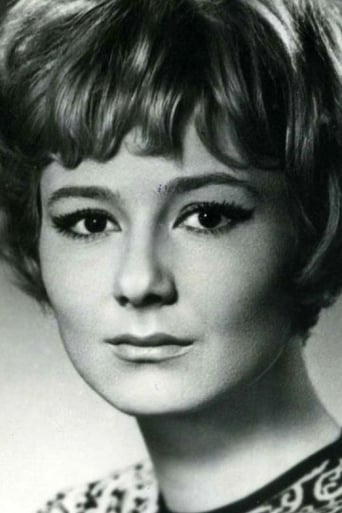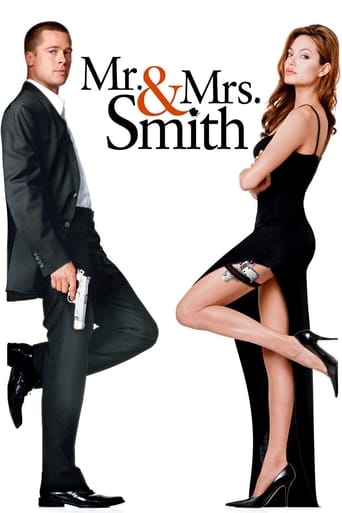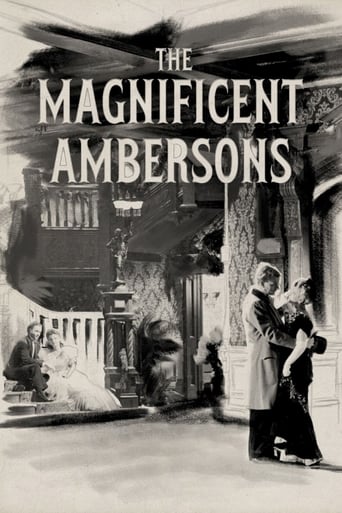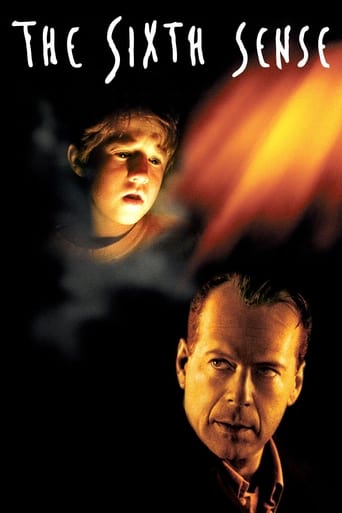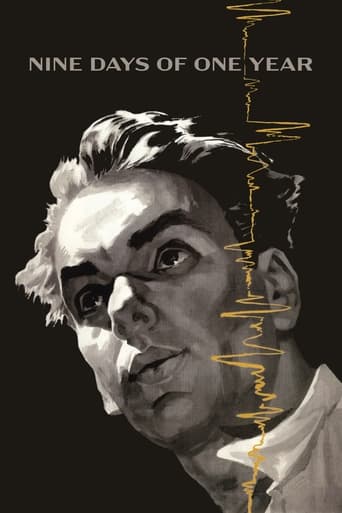
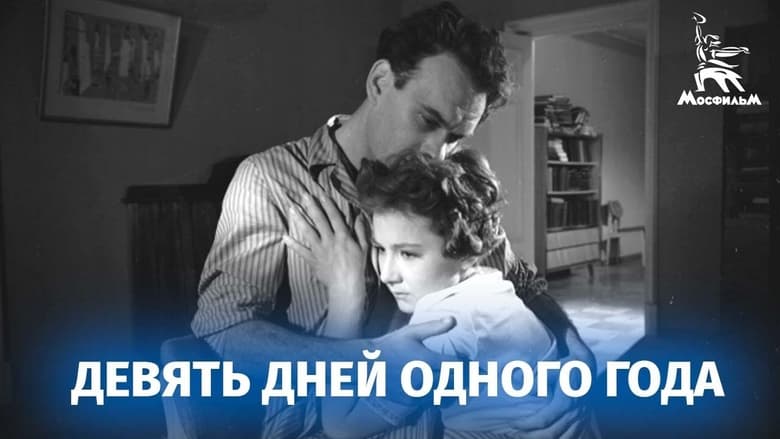
Nine Days of One Year (1962)
Two young scientists are exploring new fields of nuclear physics. Dmitry Gusev and Ilya Kulikov are good friends, but rivals in love. Dmitry marries Lyolya and they live happily together. Luck has it that he makes an important discovery. Unfortunately he exposes himself to radioactivity during the experiments. As a result he falls seriously ill. However Dmitry has a strong spirit. His will to live, the deep passion for his work and his strong love for mankind makes it possible for him to recover.
Watch Trailer
Cast


Similar titles
Reviews
A fantastic film with elements of the existential ponderings of Bergman, new wave filmmaking ala Chabrol or Godard, and the Soviet science fiction of the Strugatsky brothers, 'Nine Days of One Year' tells the story of a Soviet physicist risking his life to make breakthroughs in thermonuclear energy. The scientist, Dmitri (or Mitya, played by Aleksey Batalov), is also in a love triangle with his friend and colleague Ilya (Innokenty Smoktunovsky) for the affections of another scientist, Lyoyla (Tatyana Lavrova).Director Mikhail Romm pulls all the right strings as he creates beautiful scenes and evokes emotion. The massive machinery of the reactor, the experiments, and the personalities involved all feel very real, and those with a background in science may especially like this film. Hey, this is a movie where, at a wedding, nuclear physics and space travel are discussed! But that scene has such a light and organic feel to it, with the colleagues interrupting one another during their toasts (as well as performing a few calculations on napkins), that despite what sounds like dry subject matter, it's wonderful. Smoktunovsky turns in a great performance as Ilya, who makes philosophical and often cynical comments on humanity and its use of technology. "Mankind has reached such perfection that it can eliminate all life on Earth in 20 minutes," he says early on. And yet the film has an optimism to it as well. When one scientist points out how impossible travel to the edge of the galaxy would be, another says that "when Tsiolkovsky developed his rocket equation sitting in the restaurant Yar, scientific skeptics like you, doodling on their napkins, concluded that he was crazy. Yet today we fly in space." Konstantin Tsiolkovsky was a real scientist, and developed his equation in 1897, and the film does have a certain pride in Russian/Soviet technology, rightfully so.Tatyana Lavrova is also strong as Lyolya, at first whimsical as she tries to figure out which of the two she should marry, and then melancholy as she finds herself neglected. She is a nuclear physicist herself, and it's sad when she begins to doubt herself as a wife and scientist. As Mitya sacrifices his health by being exposed to harmful levels of radiation, she sacrifices her happiness in supporting him through his frustrations when the experiments aren't successful. The inner dialogue Romm employs with her is great, particularly in a scene when Ilya is expounding on makind, which I've excerpted below. Batalov plays the grim and determined Mitya well, and the scene when he visits his family and talks to his elderly father is especially poignant. The film was made in 1962 at the height of the Cold War (with the US and USSR feverishly developing massive atomic bombs and about to head into the Cuban Missile Crisis, among other things), but it only has a few glimpses of nationalism. In one, the Western uses of science to advance warfare in horrific ways are alluded to, and contrasted with Mitya's desire to create a thermonuclear reaction to produce energy, which will help "advance communism". In another, Mitya tells his father that the Soviets needed to have developed the bomb or they would have been eliminated along with half the people on earth, presumably because of the Americans. However, the film also has one of the Soviet scientists saying that modern warfare promotes science, that the two are inseparable, and there is also a reference to Stalin's purges, as Ilya says he would have known to hold his tongue to avoid appearing "ideologically unreliable." That's a remarkable reference, considering how touchy the subject was. Just a few years earlier, Vasily Grossman's epic novel 'Life and Fate' (which also features a nuclear physicist as a protagonist), was seized by the KGB, and despite some softening under Khruschev, citizens and artists still had to be very careful. I've rambled probably a bit too much here, and will summarize. Don't be afraid of the physics! Or that this sounds like a dark film from behind the Iron Curtain. It's beautiful, philosophical, and uplifting, and it's also a fascinating window into the USSR in 1962. Quotes: On technology and warfare. Ilya: "Science advanced the knowledge of chemistry. And then the Germans invented poison gas. The internal combustion engine was developed, and the English built tanks. The chain reaction was developed, and the Americans dropped the bomb on Hiroshima. Doesn't it make you want to stop and think?"On mankind: Ilya: "Do you really think that man has become more intelligent in the last 30,000 years? No, our brain has not grown bigger. The inventor of the wheel was as brilliant as Einstein. Whoever discovered fire was smarter than a quantum physicist. Think about the pharaoh Akhenaton. He lived 4,000 years ago. Or queen Nefertiti. What fine, intellectual, inspired faces. And now look around you. Neanderthals. Look at them. Look at them. (pointing) There. Look over there. Those are Danes there. Those are ours. Americans. Look at that Australopithecus. Waiter: "May I help you?" Ilya: "No, no. Nothing. (continuing to Mitya) But a pharaoh could only destroy 5,000, maybe 10,000 people. Today that is nothing - a trifle." Lyolya (thinking): "He loves me. He still loves me. I can see it now. Mitya, look my way. He doesn't want to. Ilya looks at me." Ilya: "And no Genghis Khan could imagine the death camps and gas chambers. He wouldn't think to fertilize fields with human ashes, fill mattresses with women's hair or make lampshades from human skin." Mitya: "You know Ilya, I envy you. Only an optimist can afford to view the world with such pessimism. You must be doing well."On communism: Mitya: "I'm sick and tired of your kind nature." Ilya: "Building communism requires even kind-hearted people."On fools; this one seemed dead-on relative to the current president of the US: Ilya: "Fools are always interesting, Mitya. Fools are, so to speak, a social phenomenon. I make a study of them. Life would be incomplete without fools. A fool reflects his times with amazing precision. The wise may be either ahead of or behind their times. This doesn't happen with the fool."
Nine Days of One Year (1962) was directed by Mikhail Romm and is part of the Khrushchev Thaw in Soviet filmmaking. The premise of the Cold War-era film is ballsy as it concerns the development of weapons of mass destruction. Mitya Gusev, a talented physicist, desires to harness his scientific discovery for the benefit of communism (by providing the energy for his brethren), but others along his path prompt Gusev to use his breakthrough for war. The unique narrative that highlights only nine days over the course of a year is particularly striking. By privileging only a few moments, the film creates an underlying importance in every waking moment. Gusev possesses the innocence and "childishness" (the "adults" being apathetic) that categorized the heroes of the Khrushchev Thaw; Gusev describes himself as having "more enthusiasm than brains." Although Aleksey Batalov maintains many of the same attributes in Gusev that he carried as Boris in The Cranes are Flying (1957) (including his ultimate sacrifice for the greater good), in Nine Days of One Year he is cold, distant and unaffectionate towards Lyolya failing to even notice the robe that she's worn for the entirety of the month. Instead of simply filming men debating the fate of the world, Nine Days also simultaneously portrays the budding and eventual disintegration of a marriage as we dive into the depths of Lyolya's psyche as she tells her husband, "(she) is a woman, not a domestic pet." Her viewpoint is equally privileged to that of Gusev adding a greater dimension to the film as well as adding to its overall success. The opening of the film spares no time for exposition. It grabs you by the collar from the opening shot as we fly over a miniature towards the Institute. The form in the film is remarkable. In one instance, the camera drops down to the dinner table as if a bomb is being dropped on the discussion. The scene is concluded pulling back into the sky as if detracting from the crucial moment in order to recognize the smallness of the conversation in the grand scheme of humanity. While there are shots of pure dynamism (rapid whip pans, Dutch angles and quick cutting), Romm often favors a wide lens, low angles and elaborate in depth staging in long takes to carry forth the narrative. Romm gives us an incredible extreme long shot of Gusev walking to the lab on the eighth day across a blank brick wall. The stark emptiness within the frame creates a canvas for the audience to project Gusev's feelings – how does the failure to discover thermonuclear energy weigh on Gusev, and most of all, is the ultimate sacrifice worth it? The film also poses an interesting question earlier on – is the basis of humanity's perfection measured in its ability to exterminate itself?
first virtue - Russian flavor, result of precise recipes. than - brilliant performance , nothing new when the cast is represented by Batalov and Smoktunovsky. but, more important, the script. it is a Soviet story but root is not science, not a love story, not the sacrifice of a remarkable man for humanity benefit but the existence like huge puzzle. images, music, the light, the force of shadows, all are ingredients of an universal tale and about reasons of small and ordinaries gestures. and it is not a surprise because a great director and a magnificent cast are wise parts for a form of poem in images, not exactly an art film but a film of ideas, behind propaganda command, before Perestroika wave.so, must see it !
I am Russian, I am a scientist, and, probably, that's why I like it. This film together with the book by brothers Strugatsky "Monday begins on Saturday" forms a manifestation of the Russian science spirit, as it was in good old Soviet era days. May be, the very special atmosphere of leading Soviet research institutes, the atmosphere of creativity and self-sacrifice, is one of a few positive contributions that communists have brought to the Russian culture. At least, the film of Mikhail Romm brings us to the wonderland, where people believe in what they do. Romm tells us a sad and beautiful story about an island of freedom, the island which is nowadays lost under the waters of "real life".


